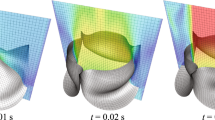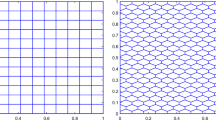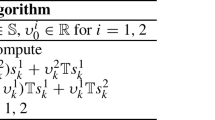Summary.
Stabilisation methods are often used to circumvent the difficulties associated with the stability of mixed finite element methods. Stabilisation however also means an excessive amount of dissipation or the loss of nice conservation properties. It would thus be desirable to reduce these disadvantages to a minimum. We present a general framework, not restricted to mixed methods, that permits to introduce a minimal stabilising term and hence a minimal perturbation with respect to the original problem. To do so, we rely on the fact that some part of the problem is stable and should not be modified. Sections 2 and 3 present the method in an abstract framework. Section 4 and 5 present two classes of stabilisations for the inf-sup condition in mixed problems. We present many examples, most arising from the discretisation of flow problems. Section 6 presents examples in which the stabilising terms is introduced to cure coercivity problems.
Similar content being viewed by others
Author information
Authors and Affiliations
Additional information
Received August 9, 1999 / Revised version received May 19, 2000 / Published online March 20, 2001
Rights and permissions
About this article
Cite this article
Brezzi, F., Fortin, M. A minimal stabilisation procedure for mixed finite element methods. Numer. Math. 89, 457–491 (2001). https://doi.org/10.1007/PL00005475
Issue Date:
DOI: https://doi.org/10.1007/PL00005475




